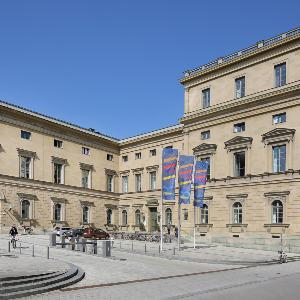Six LMU Researchers Elected as Members of the BAdW
16 Apr 2025
The new members of the Bavarian Academy of Sciences (BAdW) conduct research in the natural sciences, humanities and life sciences.
16 Apr 2025
The new members of the Bavarian Academy of Sciences (BAdW) conduct research in the natural sciences, humanities and life sciences.

© BAdW/Stefan Obermeier
Prof. Dr. Erika von Mutius is emeritus professor of pediatric allergology at LMU and director of the Institute for Asthma and Allergy Prevention at Helmholtz Zentrum München. In her research, she investigates the influence of environmental factors such as living in the city or on rural farms on the risk of asthma and allergies in children.
Prof. Dr. Peter Falkai, Director of the Clinic for Psychiatry and Psychotherapy at the LMU Medical Center, is investigating the neurobiological basis of severe mental illnesses in order to develop new diagnostic and therapeutic approaches.
Prof. Dr. Erwin Frey, Chair of Statistical and Biological Physics, is also a new member of the academy. He uses mathematical-physical models to investigate how complex biological and physical systems are dynamically organized from an imbalance.
The 2023 Nobel Prize winner, Prof. Dr. Ferenc Krausz, professor of experimental physics and director at the Max Planck Institute for Quantum Optics, is investigating ultrashort laser pulses in the attosecond range to visualize electron motion in atoms and molecules in real time.
Prof. Dr. Florian Mehltretter, head of the Department of Italian Studies, is dedicated to the history of Italian literature and ideas – with a particular focus on the reception of classical texts in modern times.
Prof. Dr. Eckhard Wolf holds the Chair of Molecular Animal Breeding and Biotechnology at LMU. The focus of his scientific work is on genetically modified pigs as new models for research into human diseases and for potential organ transplants.
The Bavarian Academy of Sciences is the largest and one of the most research-intensive and oldest of the eight state academies in Germany. It conducts innovative long-term research, connects scholars across disciplinary and national borders, contributes its scientific expertise to politics and society, promotes young scientists and is a forum for dialog between science and the public.